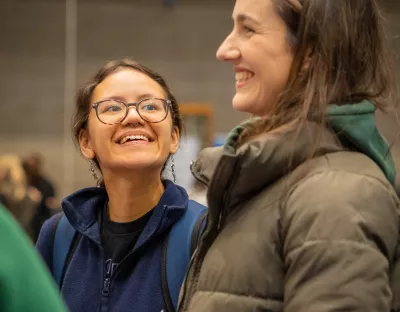Key Info
Sociology
Entry route(s):
Sociology can be taken on both LM002 Bachelor of Arts & LM019 Bachelor of Science in Social Sciences. Subject combinations & course structures can be reviewed on the appropriate programme page.
About you
Students who do sociology need to be inquisitive, and curious about the social world and how it works. You also need to be open to reconsidering all the notions and common sense views of society that we usually take for granted. Sociology shakes us up intellectually, it forces us to reconsider many of our assumptions and see the world through a lens that is often critical and challenging. Doing Sociology will empower you to re-examine the familiar with fresh eyes and provide you with the skillset to see afresh and to document the complexity of the social world.
Why study Sociology at UL?
Sociology describes and explains social structures and processes. The Sociology programme at UL will enable you to develop critical and analytical skills to look more objectively at our societies. It directs attention to how the constituent parts of society fit together and change, and the consequences of that social change. By focusing on the external forces that affect our values, attitudes and behaviours, it helps us better understand ourselves and the motivations of others around us. In addition to core modules, you can choose Sociology electives which match your own study and research interests.
Learn more about our courses and upcoming events
What you will study
Reflecting the extensive teaching and research expertise in the department, Sociology at UL focuses on a number of key themes which run throughout the four years of the programme:
- Classical and Contemporary Social theory.
- Quantitative and Qualitative Research Methods
- Sociology of Inequality (focusing, for example, on Gender, Stratification & Social Mobility, Political Economy, Urban Sociology, Youth, Migration, and Hate Crimes)
- Sociology of Media (focusing, for example on media, media audiences and popular culture)
- Sociology of health and illness
- Sociology of family (covering children, marriage and partnership, domestic and market labour, inter alia)
- Sociology of crime, victimization, and criminal justice
Modules are offered on both Bachelor of Arts (LM002) and BSc. Social Sciences (LM019) - Both are subject to change.
| Year 1 | Semester 1 | Semester 2 | |
| SO4001 | Introduction to Sociology | SO4032 | Introduction to Sociology 2 |
| Year 2 | Semester 3 | Semester 4 | |
| Core modules | Cooperative Education Work Placement | ||
| SO4073 | Classic Sociological Theory | ||
| SO4037 | Qualitative Methods for Sociological Research | ||
| Select 2 | |||
| SO4073 | Classic Sociological Theory | ||
| SO4037 | Qualitative Methods for Sociological Research | ||
| SO4063 | Introduction to Social Research Methods | ||
| SO4047 | Sociology of The Welfare State | ||
| SO4118 | Sociology of Gender and Popular Culture | ||
| SO4033 | Sociology of Media | ||
| SO4052 | Sociology of Race and Racisms | ||
| SO4083 | Introduction to Economic Sociology | ||
| Year 3 | Semester 5 | Semester 6 | |
| Erasmus/Exchange placement with a partner institution abroad | Core modules | ||
| SO4036 | Contemporary Sociological Theory | ||
| SO4046 | Quantitative Methods for Sociological Research | ||
| Select 2 | |||
| SO4036 | Contemporary Sociological Theory | ||
| SO4046 | Quantitative Methods for Sociological Research | ||
| SO4006 | The Sociology of Crime, Deviance and Social Control | ||
| SO4088 | Sociology of Globalisation | ||
| SO4078 | Inequality and Social Exclusion | ||
| SO4077 | Sociology of Youth | ||
| SO4002 | Gender: Sociological Perspectives | ||
| SO4066 | Sociology of Indigenous Mincéirì/Pavee (Irish Travellers) | ||
| SO4076 | Perceptions of Economic and Gender Inequality | ||
| Year 4 | Semester 7 | Semester 8 | |
| Select 4 | Select 4 | ||
| SO4057 | Sociology of Health and Illness | SO4208 | Sociology of Love and it’s Dark Side |
| SO4178 | Sociology of The Body | SO4082 | Political Sociology |
| SO4067 | Sociology of Work | SO4108 | Sociological Approaches to Gender and Multiculturalism |
| SO4168 | The Sociology of Mental Health and Illness | SO4218 | Sociological Perspectives Seminar Series |
| SO4004 | Consuming crime: Crime and Popular Culture in 24/7 Society | SO4168 | The Sociology of Mental Health and Illness |
| SO4128 | Sociology of the Internet | SO4132 | Comparative European Migration, Theory, Practice and Policy |
| SO4047 | Sociology of the Welfare State | SO4128 | Sociology of the Internet |
| SO8505 | Theoretical approaches to the Sociology of Racism | SO4238 | Sociological perspectives on Criminal Justice |
| SO4087 | Social Trends and Sociological Research | SO4087 | Social Trends and Sociological Research |
| SO8493 | Urban Sociology - Critically reflecting on the city |
| Year 1 | Semester 1 | Semester 2 | |
| SO4001 | Introduction to Sociology | SO4032 | Introduction to Sociology 2 |
| Year 2 | Semester 3 | Semester 4 | |
| Select 1 | Cooperative Education Work Placement | ||
| SO4073 | Classic Sociological Theory | ||
| SO4037 | Qualitative Methods for Sociological Research | ||
| Select 1 | |||
| SO4073 | Classic Sociological Theory | ||
| SO4037 | Qualitative Methods for Sociological Research | ||
| SO4063 | Introduction to Social Research Methods | ||
| SO4047 | Sociology of The Welfare State | ||
| SO4118 | Sociology of Gender and Popular Culture | ||
| SO4033 | Sociology of Media | ||
| SO4052 | Sociology of Race and Racisms | ||
| SO4083 | Introduction to Economic Sociology | ||
| Year 3 | Semester 5 | Semester 6 | |
| Erasmus/Exchange placement with a partner institution abroad | Select 1 | ||
| SO4036 | Contemporary Sociological Theory | ||
| SO4046 | Quantitative Methods for Sociological Research | ||
| Select 1 | |||
| SO4036 | Contemporary Sociological Theory | ||
| SO4046 | Quantitative Methods for Sociological Research | ||
| SO4006 | The Sociology of Crime, Deviance and Social Control | ||
| SO4088 | Sociology of Globalisation | ||
| SO4078 | Inequality and Social Exclusion | ||
| SO4077 | Sociology of Youth | ||
| SO4002 | Gender: Sociological Perspectives | ||
| SO4066 | Sociology of Indigenous Mincéirì/Pavee (Irish Travellers) | ||
| SO4076 | Perceptions of Economic and Gender Inequality | ||
| Year 4 | Semester 7 | Semester 8 | |
| Select 2 | Select 2 | ||
| SO4057 | Sociology of Health and Illness | SO4208 | Sociology of Love and it’s Dark Side |
| SO4178 | Sociology of The Body | SO4082 | Political Sociology |
| SO4067 | Sociology of Work | SO4108 | Sociological Approaches to Gender and Multiculturalism |
| SO4168 | The Sociology of Mental Health and Illness | SO4218 | Sociological Perspectives Seminar Series |
| SO4004 | Consuming crime: Crime and Popular Culture in 24/7 Society | SO4168 | The Sociology of Mental Health and Illness |
| SO4128 | Sociology of the Internet | SO4132 | Comparative European Migration, Theory, Practice and Policy |
| SO4047 | Sociology of the Welfare State | SO4128 | Sociology of the Internet |
| SO8505 | Theoretical approaches to the Sociology of Racism | SO4238 | Sociological perspectives on Criminal Justice |
| SO4087 | Social Trends and Sociological Research | SO4087 | Social Trends and Sociological Research |
| SO8493 | Urban Sociology - Critically reflecting on the city |
| Year 1 | Semester 1 | Semester 2 | |
| SO4001 | Introduction to Sociology | SO4032 | Introduction to Sociology 2 |
| Year 2 | Semester 3 | Semester 4 | |
| Core module | Cooperative Education Work Placement | ||
| SO4036 | Contemporary Sociological Theory | ||
| Select 1 | |||
| SO4037 | Qualitative Methods for Sociological Research | ||
| SO4063 | Introduction to Social Research Methods | ||
| SO4047 | Sociology of The Welfare State | ||
| SO4118 | Sociology of Gender and Popular Culture | ||
| SO4052 | Sociology of Race and Racisms | ||
| SO4083 | Introduction to Economic Sociology | ||
| Year 3 | Semester 5 | Semester 6 | |
| Erasmus/Exchange placement with a partner institution abroad | Core module | ||
| SO4046 | Quantitative Methods for Sociological Research | ||
| Select 1 if choosing Sociology as a major | |||
| SO4006 | The Sociology of Crime, Deviance and Social Control | ||
| SO4088 | Sociology of Globalisation | ||
| SO4077 | Sociology of Youth | ||
| SO4002 | Gender: Sociological Perspectives | ||
| SO4066 | Sociology of Indigenous Mincéirì/Pavee (Irish Travellers) | ||
| SO4076 | Perceptions of Economic and Gender Inequality | ||
| Year 4 | Semester 7 | Semester 8 | |
| Core module | Core module | ||
| SO4033 | Sociology of Media | SO4078 | Inequality and Social Exclusion |
| Select 1 if choosing Sociology as major | Select 1 if choosing sociology as major | ||
| SO4057 | Sociology of Health and Illness | SO4208 | Sociology of Love and it’s Dark Side |
| SO4178 | Sociology of The Body | SO4082 | Political Sociology |
| SO4067 | Sociology of Work | SO4108 | Sociological Approaches to Gender and Multiculturalism |
| S04047 | Sociology of the Welfare State | SO4218 | Sociological Perspectives Seminar Series |
| SO8505 | Theoretical approaches to the Sociology of Racism | SO4168 | The Sociology of Mental Health and Illness |
| SO4087 | Social Trends and Sociological Research | SO4132 | Comparative European Migration, Theory, Practice and Policy |
| SO4128 | Sociology of the Internet | ||
| SO4148 | Sociology of Power: The Relational and Practice | ||
| SO4087 | Social Trends and Sociological Research | ||
| SO8493 | Urban Sociology - Critically reflecting on the city |
How to apply
| Where are you applying from? | How to Apply |
|---|---|
| Ireland | Irish students must apply to UL via the CAO. More information can be found here. |
| The UK | Students who have completed their A-Levels can apply to UL via the CAO. More information can be found on the Academic Registry website. |
| The EU | EU Students can apply to UL via the CAO. More information can be found on the Academic Registry website. |
| Non-EU country | If you are outside of the EU, you can apply for this subject through the Bachelor of Arts degree or |
Fees and funding
Student course fees are broken into three components - Student contribution, Student Levy and Tuition Fees.
A number of illustrative examples of fees for this course based on the current fee levels have been set out in the tables below.
An explanation of the components, how to determine status and the criteria involved is provided below the examples as is a list of possible scholarships and funding available.
EU Students with Free fees status in receipt of a SUSI grant
| HEA pays | Tuition Fees | €2,558 |
| SUSI pays | Student contribution | €3,000 |
| Student pays | Student Levy | €102 |
| Total | €5,660 |
EU Students with Free fees status not in receipt of a grant
| HEA pays | Tuition Fees | €2,558 |
| Student pays | Student contribution | €3,000 |
| Student pays | Student Levy | €102 |
| Total | €5,660 |
Students with EU fee status not in receipt of a grant
| Student pays | Tuition Fees | €2,558 |
| Student pays | Student contribution | €3,000 |
| Student pays | Student Levy | €102 |
| Total | €5,660 |
Non-EU Students
| Student pays | Tuition Fees | €16,798 |
| Student pays | Student Levy | €102 |
| Total | €16,900 |
Student course fees are comprised of the following components:
Student Contribution
Annual charge set by the government for all full-time third level students. All students are liable unless they have been approved for a grant by Student Universal Support Ireland (SUSI). Please refer to https://www.studentfinance.ie to determine your eligibility for a grant and for instructions on how to apply. The current student contribution is set at €3000.
Student Levy
All students are liable to pay the Student Levy of €102. Please note the Student Levy is not covered by the SUSI Grant.
Tuition Fees
These are based on Residency, Citizenship, Course requirements.
Review the three groups of criteria to determine your fee status as follows
-
Residency
- You must have been living in an EU/EEA member state or Switzerland for at least 3 of the 5 years before starting your course
-
Citizenship
- You must be a citizen of an EU/EEA member state or Switzerland or have official refugee status
-
Course Requirements
(all must be met)
- You must be a first time full-time undergraduate (Exceptions are provided for students who hold a Level 6 or Level 7 qualification and are progressing to a Level 8 course in the same general area of study).
- You must be undertaking a full-time undergraduate course of at least 2 years' duration
- You cannot be undertaking a repeat year of study at the same level unless evidence of exceptional circumstances eg serious illness is provided (in which case this condition may be waived)
Depending on how you meet these criteria your status will be one of the following -
- Free Fee Status: You satisfy all three categories (1, 2 and 3) and therefore are eligible for the Higher Education Authority’s Free Fees scheme.
- EU Fee Status: You satisfy both the citizenship and residency criteria but fail to satisfy the course requirements and are liable to EU fees.
- Non EU Fee Status: You do not meet either the citizenship or residency criteria and are therefore liable to Non EU fees.
More information about fees can be found on the Finance website
These scholarships are available for this course
| Title | Award | Scholarships Available |
|---|---|---|
| Johnson and Johnson WiSTEM2D Programme |
These scholarships are available for all courses
| Title | Award | Scholarships Available |
|---|---|---|
| All Ireland Scholarships - sponsored by J.P. McManus | €6,750 | 125 |
| Brad Duffy Access Scholarship | €5,000 for one year | 1 |
| Bursary for my Future Scholarship | €2,750 one off payment | 4 |
| Civic Engagement Scholarship | €1500 | 1 |
| Cooperative Education Award | 1 medal per faculty | |
| Elaine Fagan Scholarship | €1,500 | |
| Financial Aid Fund | ||
| Hegarty Family Access Scholarships | €5,000 for one year | 2 |
| Higher Education Grants & VEC Grants | ||
| Irish American Partnership Access Scholarships | €5,000 | 2 |
| Paddy Dooley Rowing Scholarship | €2,500 | |
| Plassey Campus Centre Scholarship Programme | ||
| Provincial GAA Bursaries Scheme | €750 | |
| Stuart Mangan Scholarship | ||
| The Michael Hillery and Jacinta O’Brien Athletics Scholarship | Various benefits equating to over €7,000 in value | |
| UL Sports Scholarships | Varies depending on level of Scholarship | Multiple |
Your future career
A wide range of career opportunities are open to you from this programme, in the public, private and non-profit/NGO sectors: UL Sociology graduates have found careers in a diverse range of areas including:
- Journalism, media, communications and public relations
- Teaching at Second Level
- Social, marketing and media research
- Social policy analysis
- Urban planning
- Research consultancy
- Postgraduate Training to either Masters or PhD Levels
- Social work, youth and community work
- Prison and probation services
- Community Development
- Voluntary organisations, national and international NGOs
- Statistician, demographer


